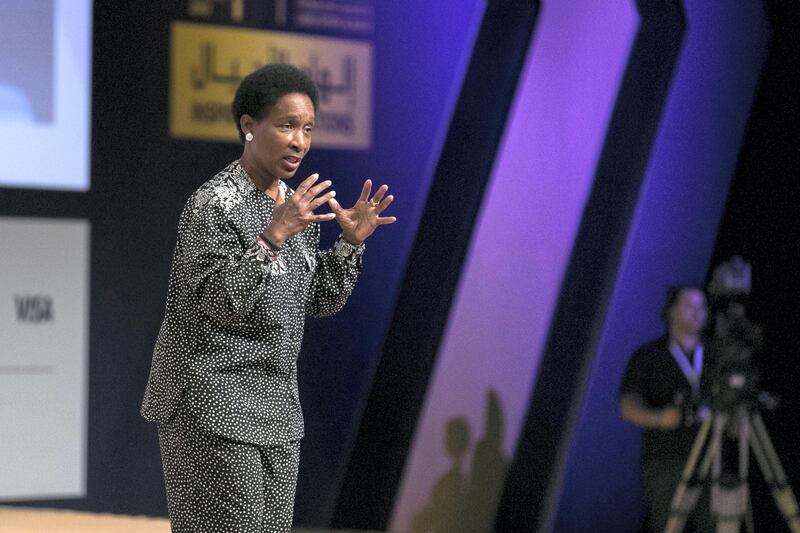Growing up, Loretta Claiborne was so poor she would wear plastic bags over her socks to protect her feet from the snow.
It would be her feet and the words of her mother that would carry her to Special Olympic victory in 1983, earning her first gold medal in the mile run. She would go on to compete in five more Special Olympic games, earning 10 medals in total.
“If you quit today, you will always quit,” her mother would say. Ms Claiborne was born partially blind and with an intellectual disability in Pennsylvania in 1953.
She faced bullying and poverty as a child.
“Kids like me were sent to places called institutions. Growing up, I was a nobody. I was like dirt or the scum of the earth. I lived my life using my fists. That’s how I spoke. I had no voice. I had no value. What was the point of using my voice?” she said at the Fourth International Conference of Sport for Women in Abu Dhabi on Tuesday.
“I felt so down but always remembered my mom telling me that if I took my life, I would never see the eyes of God. My life was horrible. It was brutal,” Ms Claiborne said.
Her mother fought to keep her in city schools so she would achieve a high school diploma.
“She said, I want you to be the best. I have no quitters in my house.”
_______________
Read more:
[ Emirati women make great strides in sports participation ]
[ Female athletes share their stories ahead of Abu Dhabi sports conference ]
_______________
Ms Claiborne is a long way from the girl who lived in the projects and was continuously mocked by her peers. “I could barely read and the only word I knew was the Olympics,” she said.
At age 17, her counsellor at a workshop where she worked gave her a leaflet and advised her to sign up for the Special Olympics.
The leaflet said the program was for people who suffered from “mental retardation” and was free of charge, another incentive for her mother to agree that she participate.
“We were poor. We were so poor we had to wear plastic bags on our socks to go to school because we had 32-inch snow but I wanted to go and I didn’t cost a single dollar.”
From that day on, Ms Claiborne says she only grew. If not for the Special Olympics she said she would be in an entirely different place. “In prison or six feet under.”
Today, the 64-year-old is a global spokesperson and a member of the current board of directors for the Special Olympics, which will be held for the first time in Abu Dhabi in 2019.
“Special Olympics has made a lot of difference not just in my life but in the way people accept People of Determination. We are not Olympians, we are not the fastest, we are not the highest, we are not the strongest and no, we are not Paralympics - the physically challenged who use different aids and wheelchairs - we are people with intellectual disabilities,” said Ms Claiborne.
Organisers are looking to recruit 20,000 volunteers for the 2019 Special Olympics which will bring together 7,000 athletes from 170 countries and is expected to attract half a million spectators. It is the first time the Special Olympics will be held in a Middle Eastern country.
“The world is coming to Abu Dhabi and if I see the difference it will make in people from the United States coming to Abu Dhabi, my dream will be successful.”
The games, she said will break down the stereotypes. “You will see a friendly war being played, no guns, no knives but people playing a friendly game on the field and the best game is breaking down stereotypes about people with intellectual disability or people with determination.”





